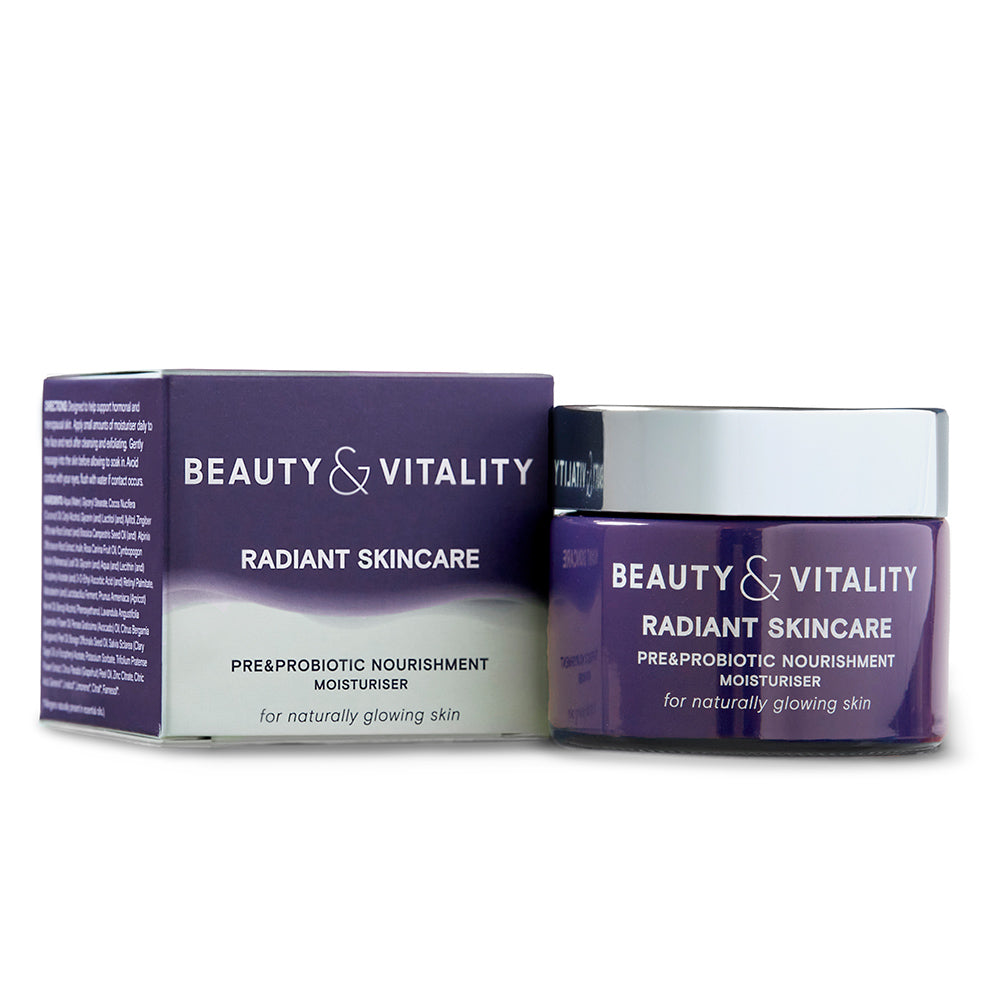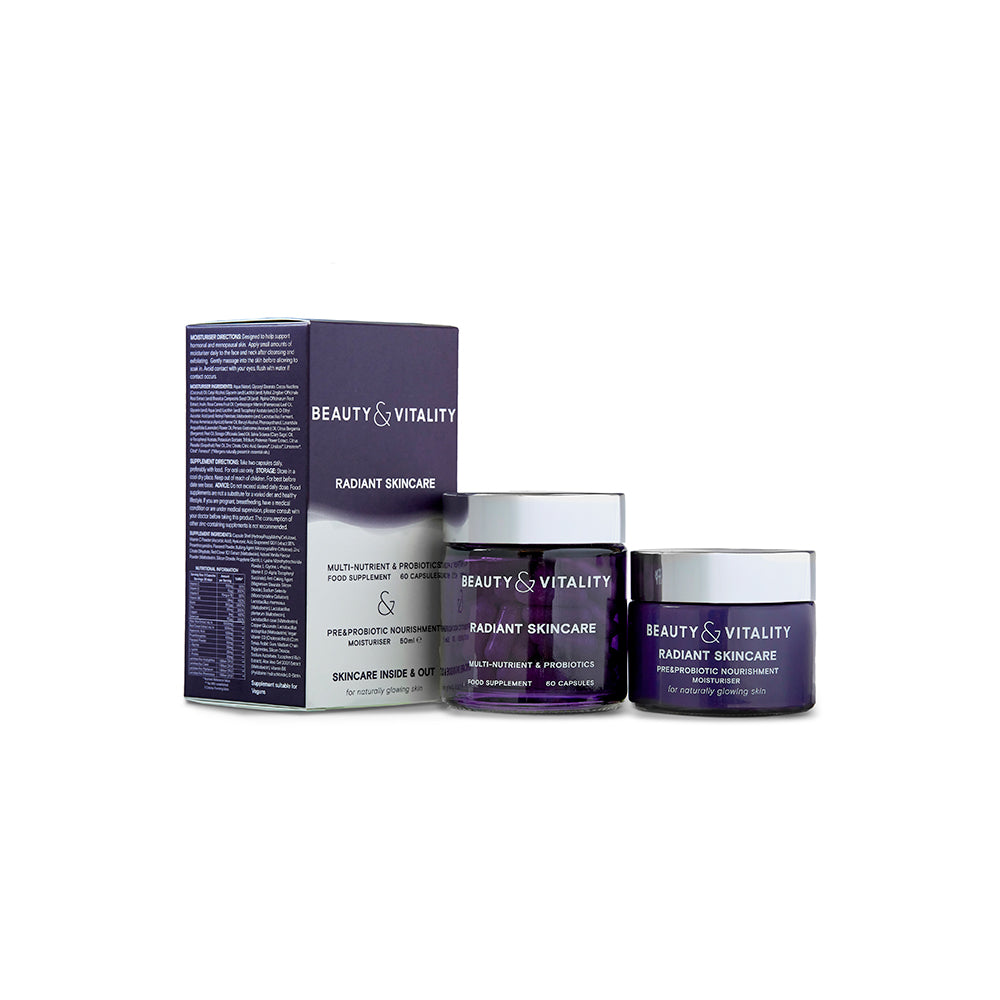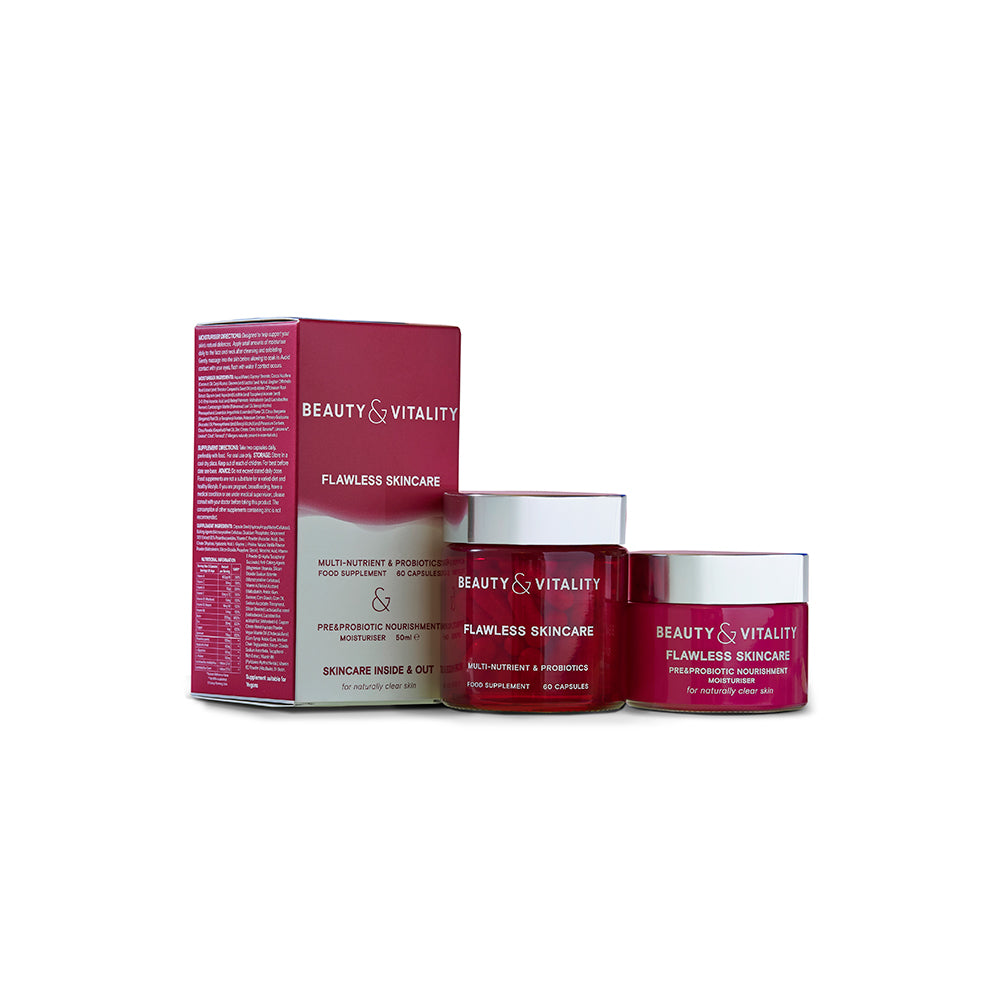
The skin’s outer layers are home to densely populated micro-organisms known collectively as the microbiome. These organisms have a symbiotic relationship with your skin’s health, and boosting the balance of healthy microbiota can help to improve it. This article presents the latest findings from scientific research on the balance of the skin’s microbiome and its relationship with the gut microbiome, and how improvements in microbiome health can help counter acne, breakouts and other skin conditions as well as slow the signs of ageing.
Human skin is the largest and most versatile organ of the human body and acts as a shield to protect us from everyday pathogens. The skin is composed of three layers, epidermis, dermis, and the hypodermis. The outer layer: the epidermis, is a multi-layered epithelial tissue, with its outermost layer or stratum corneum providing the barrier function.
The skin’s epidermis and dermis contain a universe of densely populated micro-organisms, known as the microbiota and collectively referred to as the microbiome. The microbiome has a symbiotic relationship with the skin, sending and receiving signals to and from the body’s immune system[i]. Disruption to the immune system is likely to result in a skin dysfunction, disturbing the delicate balance of the microbiota having a detrimental effect on skin health.
The make-up of microbiota present on your skin is the consequence of genetics and diet, gender, age and ethnicity, as well as external influences such as lifestyle, where we live and time of year. Microbiome composition is therefore unique between individuals, differs by skin area and constantly changing over time.
The delicate balance of our skin’s microbiome is continuously changing depending on our diet, lifestyle, stress levels, weight management, preservatives in make-up, even our sleep position. Add to this pollution, excess UV, domestic chemicals and cleaning products, as well as intrinsic factors such as over production of sebum oil during puberty or hormonal changes later in life; all these factors leave the microbiota frequently adjusting to maintain a healthy balance.
Should the delicate balance of the microbiota be disturbed this can lead to the emergence of skin conditions such as acne, atopic dermatitis and psoriasis.[ii] Skin conditions can allow allergens or chemicals into the deeper layers of the epidermis, delaying recovery and/or further aggravating the condition.
There are many studies on skin conditions but studies of the triggering factors on the skin’s microbiota are still relatively few and far between. Recent research[iii] confirmed the importance of a healthy gut microbiome, and the gut-skin relationship mentioned by Arck et al, in 2010, supports the theory that a healthy balance of microbiota in the gut boosted by probiotic enriched supplements can help boost the microbiota and restore the skin barrier by bringing balance to the microbiome. In turn a balanced microbiome can help reduce conditions like eczema, acne, dry skin, even wrinkles. “Conditions like rosacea, psoriasis, eczema, and acne are really inflammatory conditions, and often a manifestation of something that is happening deeper within the body. When you fix the gut (which, depending on your health, might include getting rid of an infection, eating a clean diet, and taking a probiotic), skin issues often resolve as well.” Said Dr Amy Myers[iv]
Probiotic Infused Skincare Solutions

Radiant Skincare Prebiotic & Probiotic Moisturiser (50ml)

New Clean Formula Radiant Multi-Nutrient & Moisturiser Kit

New Clean Formula Flawless Multi-Nutrient & Moisturiser Kit
Studies supporting this theory also suggest good skin bacteria help counter the bad. Increasingly robust science shows that using a skin care product with prebiotics and probiotics can help boost the skin’s microbiome for a healthier, glowing complexion.[v]
But why should probiotics help?
Probiotics are live micro-organisms which when applied in adequate amounts can boost the good microbiota, influence what they do and help kill off bad bacteria. Studies have shown that probiotics can boost the skin’s production of ceramides, help moisturise the skin and counter acne causing bacteria. Lactobacillus Acidophilus & Lactobacillus Casei for example are noted for their potential to help the skin barrier with acne and redness. Lactobacillus Plantarum can help with collagen and ceramide production[vi] which can assist in skin rejuvenation, whilst Lactobacillus Rhamnosus is one of the more widely used probiotic strains that not only boosts the intestinal barrier function but also boosts the skin barrier function.
Prebiotics commonly referred to as complex carbohydrates, feed the healthy microbiota which in turn help keep the bad bacteria in check. Prebiotic can help restore fragile skin, reduce itching and improve moisture absorption helping to rebalance the microbiome, undoing the negative effects of preservatives, purifying the skin of the bad bacteria and increasing the prevalence of good.
In conclusion, the positive impact of probiotics and prebiotics on the skin’s microbiome is becoming increasingly evident in recent research. The combination of these ingredients, taken orally or applied topically, are more efficient at delivering skin barrier benefits and combating dysfunctions and the ageing process. It was these insights that excited our nutrition and dermatology team and led to our setting up the new brand innovation called Beauty & Vitality. The result: its powerful combination supplement and moisturiser proposition. With more research coming through, all purporting the benefits of caring for the skin’s microbiome with probiotics and prebiotics, we are confident further skin innovations will follow.
References:
[i] J Eur Acad Dermatol Venereol. 2016 Dec; 30(12): 2038–2047. Published online 2016 Oct 13. doi: 10.1111/jdv.13965
[ii] Draelos Z.D. New treatments for restoring impaired epidermal barrier permeability: Skin barrier repair creams. Clin. Derm. 2012;30:345–348. doi: 10.1016/j.clindermatol.2011.08.018. [PubMed] [CrossRef] [Google Scholar]
[iii] 92. Nishijima S, Suda W, Oshima K, Kim SW, Hirose Y, Morita H, et al The gut microbiome of healthy Japanese and its microbial and functional uniqueness. DNA Res 2016; 23: 125–133. [PMC free article]
[iv] Dr. Amy Myers https://goop.com/wellness/health/the-good-skin-healthy-gut-guide-to-probiotics/ Amy Myers, M.D. is the founder and medical director of Austin UltraHealth, a functional medicine clinic based in Austin, Texas. Dr. Myers specializes in women’s health issues, particularly gut health, thyroid dysfunction, and autoimmunity. She is also the New York Times bestselling author of The Autoimmune Solution and The Thyroid Connection.
[v] https://www.healthline.com/health/probiotics-skin-care
Medically reviewed by Sara Perkins, MD — Written by Colleen de Bellefonds on September 9, 2020
[vi] Int J Med Sci 2021; 18(5):1114-1120. doi:10.7150/ijms.51545
Research Paper: Regulatory effects of Lactobacillus plantarum-GMNL6 on human skin health by improving skin microbiome
Wan-Hua Tsai1, Chia-Hsuan Chou1, Ying-Ju Chiang1, Ching-Gong Lin2, Che-Hsin Lee
Safety
The information provided on this site is for educational purposes only and is not intended to diagnose or treat any medical condition. If you are taking any medications, have a diagnosed medical condition, or are pregnant or breastfeeding, please consult your doctor or health practitioner before taking supplements.
